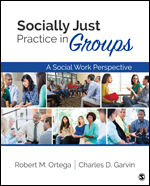Socially Just Practice in Groups
A Social Work Perspective
Robert M. Ortega - University of Michigan, USA
Charles David Garvin - University of Michigan, USA
Available formats
See what’s new to this edition by selecting the Features tab on this page. Should you need additional information or have questions regarding the HEOA information provided for this title, including what is new to this edition, please email sageheoa@sagepub.com. Please include your name, contact information, and the name of the title for which you would like more information. For information on the HEOA, please go to http://ed.gov/policy/highered/leg/hea08/index.html.
For assistance with your order: Please email us at textsales@sagepub.com or connect with your SAGE representative.
SAGE
2455 Teller Road
Thousand Oaks, CA 91320
www.sagepub.com
study.sagepub.com/ortega
Free online resources for instructors accompany this text on a password-protected Instructor Resource Site.
- Editable, chapter-specific PowerPoint® slides offer complete flexibility for creating a multimedia presentation.
- Class activities reinforce active learning through individual and group projects.
- Quizzes containing multiple choice and true/false questions effectively assess students’ progress and understanding.
KEY FEATURES:
- A unique social justice framework is used to examine all aspects of group practice and highlights this important value of the profession.
- Detailed case examples and exercises illustrate concepts and help students develop their skills.
- An emphasis on research supports an evidence-based approach to practice.
- Chapter-ending summaries and discussion questions help students review content covered and reinforce learning through activities.

